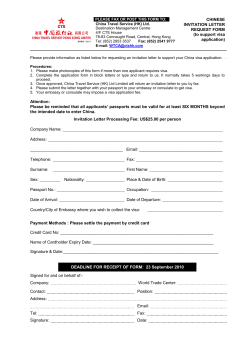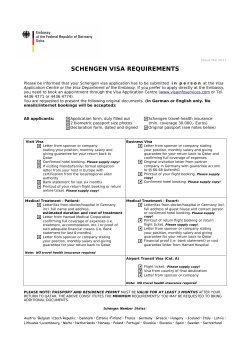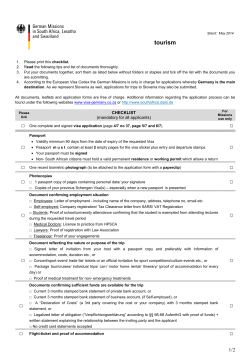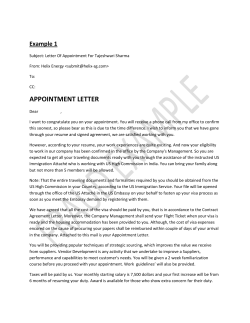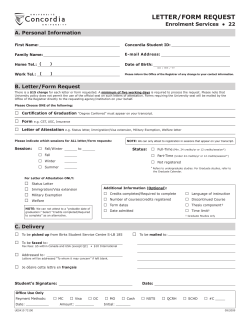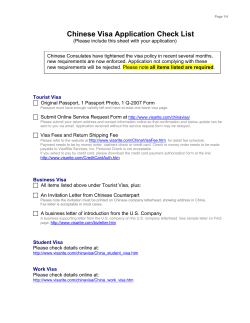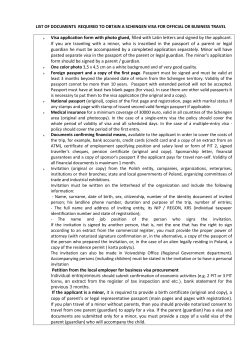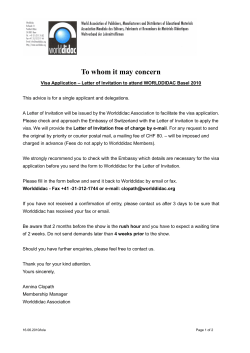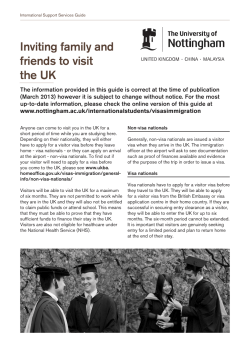
Schengen Visas
Schengen Visas (Source: en.wikipedia.org/wiki/Schengen_Area) (1) What is Schengen? Schengen is a town in Luxembourg which has lent its name to a treaty, called the Schengen Agreement, signed in 1985 between five member states of the then European Economic Community. The aim of this treaty is to harmonize short-term immigration practices, including visas. At present, 25 countries have signed the Schengen Agreement. These include: Austria, Belgium, Czech Republic, Denmark, Estonia, Finland, France, Germany, Greece, Hungary, Iceland, Italy, Latvia, Lithuania, Luxembourg, Malta, Netherlands, Norway, Poland, Portugal, Slovakia, Slovenia, Spain, Sweden and Switzerland. While the Agreement has been wrapped into European Union law, not all EU members have signed or implemented the Agreement and not all signatory countries are members of the EU. Bulgaria, Cyprus and Romania, while EU members, have not yet implemented Schengen regulations. Ireland and the United Kingdom, also EU members, have not signed the Agreement. Iceland, Norway and Switzerland, however, have signed the Schengen Agreement although they are not EU members. (2) What is the difference between a Schengen visa and a national visa? As stated above, the Schengen Agreement harmonizes short-term immigration policy among its signatory countries and gives Schengen visa holders access to the whole of the Schengen zone. Short term refers to stays less than 90 days. All long-term immigration matters remain the purview of each signatory state. Therefore, Schengen visas are only valid for stays up to 90 days. Any stay longer than 90 days is subject to the rules in place for the applicant’s host country’s national visa. (3) Who needs to get a Schengen visa for study? Students traveling on a U.S. passport to study less than 90 days in a country (or countries) in the Schengen zone. Other nationalities, however, may need to obtain a visa prior to their arrival. These students should address their questions to the closest embassy or consulate of the Schengen country where they intend to spend the majority of their stay in the Schengen zone. Students, even U.S. passport holders, whose primary purpose in traveling to a Schengen state is research or short-term employment should inquire about their need for a visa to the Schengen country where they intend to spend the majority of their stay in the Schengen zone. (4) Short-Term Stays in France While France is part of the Schengen area, there is an agreement with the U.S. government which permits students traveling on a U.S. passport to stay in France up to 90 days without a visa to spend an additional 90 days in other Schengen countries without a visa. Both 90-day limits are over a 180-day period, however. This means that students spending 90 days in France must spend at least 90 days outside of France before they would be permitted to re-enter French territory without a visa. Schengen States in the United States Embassy of Austria Consular Section http://www.austria.org/content/view/40/65/ 3524 International Court, NW, Washington DC 20008, (202) 895 6700 austrianembassy@washington.nu Embassy of Belgium http://www.diplobel.us/TravelingBelgium/visas/visitors.asp#Schengen 3330 Garfield St., NW, Washington DC 20008, (202) 333 6900 washington@diplobel.org Embassy of the Czech Republic http://www.mzv.cz/washington/en/consular_information/K_3_short_term_visa/index.html 3900 Spring of Freedom St, NW, Washington DC 20008, (202) 274 9100 con_washington@embassy.mzv.cz **Consulate General of Denmark, New York http://www.gknewyork.um.dk/en/menu/PassportVisa/TouristBusinessTransitVisa/ One Dag Hammarskjold Plaza, 885 Second Ave, 18th Fl., New York, N.Y. 10017 (212) 223 4545 nycgkl@um.dk Consulate General of Estonia in New York http://www.nyc.estemb.org/consular_information/visa_regulations#1.1 2131 Massachussets Av. N.W. Washington DC 20008, (202) 588 0108 info@estemb.org Embassy of Finland http://www.finland.org/public/default.aspx?nodeid=40963&contentlan=2&culture=en-US 3301 Massachusetts Av., NW, Washington DC 20008, (202) 298 5800 passi.was@formin.fi Embassy of France, Visa Section http://www.consulfrance-washington.org/spip.php?article384 4101 Reservoir Road, NW, Washington DC 20007 (202) 944 6200 visas@consulfrance-washington.org Embassy of Germany, Consular Office http://www.germany.info/Vertretung/usa/en/04__Legal/02__Directory__Services/01__Visa/__Visa.html 4645 Reservoir Rd NW, Washington DC 20007 (202) 298 4000 Embassy of Greece, Consular Office http://www.greekembassy.org/Embassy/content/en/Article.aspx?office=11&folder=79&article=20629 2217 Massachusetts Av. NW, Washington DC 20008, (202) 939 1306 consulate@greekembassy.org Embassy of Hungary, Consular Section http://www.huembwas.org/Consul/eng/visa/Visa_max_90_days_En.htm 3910 Shoemaker St., NW, Washington DC 20008, (202) 362 6730 visa.was@kum.hu Embassy of Iceland http://www.iceland.org/us/the-embassy/consular-service/passport-visa/ House of Sweden, 2900 K St., NW Washington DC 20007, (202) 265 6653 icemb.wash@utn.stjr.is Embassy of Italy, Consular Section http://www.esteri.it/MAE/EN/Ministero/Servizi/Stranieri/IngressoeSoggiornoInItalia.htm 3000 Whitehaven St. NW, Washington DC 20008 (202) 612 4423/4429 visti.washington@esteri.it Embassy of Latvia http://www.latvia-usa.org/test.html 2306 Massachusetts Ave, NW, Washington DC 20008, (202) 328 2840 embassy.usa@mfa.gov.lv Consulate General of the Republic of Lithuania in New York http://ny.mfa.lt/index.php?-1742203908 420 Fifth Ave. 3rd Fl., New York, NY 10018, (212) 354 7840 info@ltembassyus.org Embassy of the Grand-Duchy Luxembourg http://washington.mae.lu/en/Consular-Section/Visas 2200 Massachusetts Ave, NW, Washington DC 20008, (202) 265 4171 washington.info@mae.etat.lu Embassy of Malta http://www.mfa.gov.mt/Default.aspx?MDIS=532 2017 Connecticut Ave, NW, Washington DC 20008, (202) 462 3611 christine.pace@gov.mt The Royal Netherlands Embassy http://dc.thenetherlands.org/Services/Consular_services/Visa/Other_citizens/Traveling_to_the_Netherlands/Tourist_Business_V isa_for_The_Netherlands_Schengen 4200 Linnean Ave. NW, Washington DC 20008, 1 877 388 2443 was-ca@minbuza.nl **The Royal Norwegian Embassy, Consular Section http://www.norway.org/Embassy/Visa-and-Passports1/Visa/ 2720 34th St, NW, Washington DC 20008, (202) 944 8939 emb.washington@mfa.no Embassy of the Republic of Poland Consular Division http://www.washington.polemb.net/index.php?document=104 2224 Wyoming Ave, Washington DC 20008-3992, (202) 234 3800 ext.2201 polconsul.dc@verizon.net Embassy of Portugal http://www.embassyportugal-us.org/visa 2012 Massachusetts Avenue, NW Washington DC 20036, (202) 328 8610 embportwash@attglobal.net Embassy of the Slovak Republic http://www.mzv.sk/servlet/washingtonzu?MT=/App/WCM/ZU/WashingtonZU/main.nsf/vw_ByID/ID_621F5291A E4A5FD4C125715B004FFE51_EN&TG=BlankMaster&URL=/App/WCM/ZU/WashingtonZU/main.nsf/vw_ByID/ ID_51526D56CEA5A91BC125740F005964A2_EN&OpenDocument=Y&LANG=EN&HM=15TraveltoSlovakia&OB=0 3523 International Court, NW, Washington DC 20008, (202) 237 1050 consul@slovakembassy-us.org Embassy of the Republic of Slovenia http://washington.embassy.si/index.php?id=429&L=1 2410 California St, NW, Washington DC 20008, (202) 386 6601 vwa@gov.si Embassy of Spain http://www.maec.es/subwebs/Consulados/Washington/en/MenuPpal/ServiciosConsulares/RequirementsEntrSpainVi sas/Paginas/visas_emblondon.aspx#sec1 2375 Pennsylvania Av., NW Washington DC 20037, (202) 728 2330 cog.washington@mae.es **Embassy of Sweden http://www.swedenabroad.com/Page____27779.aspx 2900 K St., NW Washington DC 20007 (202) 467 2600 visa@foreign.ministry.se Embassy of Switzerland http://www.eda.admin.ch/eda/en/home/reps/nameri/vusa/ref_visinf/visusa.html 2900 Cathedral Ave. NW, Washington, DC 20008 (202) 745-7900 **By virtue of the cooperation tied to the Nordic Passport Union, some countries will accept and process visa applications for one another. MEMO/10/111 Brussels, 30 March 2010 The EU Visa Code will apply from 5 April 2010 What is the Visa Code? The Visa Code1 is an EU Regulation adopted by the European Parliament and the Council (co-decision procedure) in June 2009, directed to the Consulates of States applying the common visa policy. It will be applied as from 5 April 2010 by these States' Consulates all over the world. The rules on the submission of visa applications for short stay visas apply to all nationalities that are under a visa obligation to travel to the States applying the common visa policy. - The Visa Code is one of the main three instruments that will form the legal framework for short stay (Schengen) visas: - List of third countries whose nationals must be in possession of visas when crossing the external borders and those whose nationals are exempt from that requirement: Regulation (EC) No 539/2001 - Community Code on Visas (Visa Code): Regulation (EC) No 810/2009 of the European Parliament and of the Council establishing a Community Code on Visas (Visa Code) - Uniform format for visas: Council Regulation (EC) N° 1683/95 of 29 May 1995 laying down a uniform format for visas The Visa Code - sets out all procedures and conditions for issuing "short stay visas" and "airport transit visas". It also establishes the lists of third country nationals who are required to hold "airport transit visas" when passing through the international transit areas of airports situated on the territory of the Member States. - covers visas issued for the purpose of "short stays", meaning stays not exceeding 90 days in any 180 days period. Legislation in relation to the issuance of visas for the purpose of long stays (beyond 90 days) remains of national competence. 1 Regulation (EC) No 810/2009 of the European Parliament and of the Council of 13 July 2009 establishing a Community Code on Visas (Visa Code), OJ 243, 15.9.2009, p 1. http://eur-lex.europa.eu/LexUriServ/LexUriServ.do?uri=OJ:L:2009:243:SOM:en:HTML 1 How will the Visa Code be applied? To ensure a harmonised application of the common rules the Handbook for the processing of visa applications and the modification of issued visas (Commission Decision adopted on 19 March 20102) and the Handbook for the organisation of visa sections and local Schengen cooperation (to be adopted in April 2010) have been drawn up on the basis of the Visa Code. The Handbooks constitute a single set of operational instructions to be applied by Member States' relevant authorities. They neither create any legally binding obligations upon Member States nor establish new rights and obligations for the persons who might be concerned by them. Which countries will apply the Visa Code? The countries applying the common visa policy are: - EU Member States, except for UK and Ireland; Bulgaria, Romania and Cyprus will apply the Visa Code once they become part of the Schengen area without internal borders - Countries that are part of the Schengen area, without being EU members (Iceland, Norway and Switzerland) What "does the Visa Code do?" The Visa Code: a) recasts the existing legislation enhances the harmonisation of procedures provides equal treatment of applicants introduces a legal framework for facilitations to apply to all visa applicants develops legal security enhances transparency Recasting existing legislation The Visa Code takes on board – in one legal instrument – the old "Schengen Decisions" and the Common Consular Instructions (CCI). • Airport transit visa The Visa Code takes on board a Joint Action from 1996 in relation to third-country nationals subject to airport transit visa requirements. The existing common list has been maintained and a new mechanism has been developed in relation to individual Member States requiring third-country nationals to hold an airport transit visa when passing through the international transit areas of airports on their territory (national list). Currently, Member States just notifies such requirements to the Council Secretariat and so far no such requirement has ever been lifted. From now on Member States will have to justify "urgent cases of massive influx of illegal immigrants" to add a third country to the list and after one year, it must be verified whether the situation is still the same or whether the third country concerned can be withdrawn from the list. For practical reasons, the existing lists will be carried over, so the first revision will take place in one year's time. 2 C(2010)1620 2 • "Transit visa" and "short stay visa" are merged With the Visa Code the "transit visa" has been merged with the "short stay visa" because the distinction is often artificial, so in future a short stay visa may be issued for the purpose of transit or stay and the allowed duration of stay will be adapted to the purpose of travel. • Third-country nationals holding a long-stay visa issued by a Member State are allowed to move freely in the territory of Member States under the same conditions as the holder of a residence permit. The Visa Code will abolish the "D+C" visa (i.e. a long stay visa allowing the holder to circulate in the territory of Member States the first 3 months of his stay on the basis of the national long stay visa). Because of the abolishment of the D+C visa a new Regulation amending the Convention Implementing the Schengen Agreement and Regulation (EC) No 562/2006 as regards movement of persons with a long-stay visa has been drawn up and is to apply at the same date as the Visa Code. The Regulation will allow third-country nationals holding a long-stay "D" visa issued by a Member State to move freely in the territory of Member States for 90 days in any 180-day period, under the same conditions as the holder of a residence permit. This will put an end to the difficulties third-country nationals had to face when legally staying in a Member State on the basis of a D visa and would restore the basic philosophy underlying the area without internal borders, i.e. that a person can travel within that area for short stays with the document on the basis of which he or she is legally present in a Member State. "Transit" visas (type "B") and "D+C" visas issued before 5.4.2010 will remain valid until their date of expiry. The Visa Code does not amend the Regulation (referred to above) relating to the "visa lists" nor does it amend the Regulation establishing the uniform format for the visa sticker. b) Harmonisation of procedures The Handbook for the processing of visa applications and the modification of issued visas provides one set of operational instructions in contrast to the existing situation where Member States have individually drawn up instructions. Additionally, a legal framework has been drawn up to enhance the harmonisation of Member States that must cooperate locally in third countries to ensure that the general rules are adapted – without deviation, though – to local circumstances. The Visa Code also sets out the legal framework for Union Delegations to play a coordinating role in the "local Schengen cooperation". c) Equal treatment of visa applicants In order to ensure that Member States apply similar processing times, the Visa Code introduces maximum deadlines (max 2 weeks) for obtaining an appointment for lodging the application and for the Member State to take a final decision on the application (15 calendar days). Only under exceptional circumstances and in individual cases this deadline could be exceeded. 3 d) New facilitations to apply to all visa applicants As from 5 April 2010, children from 6-12 years of age should only pay a visa fee of 35 EUR (the general fee is 60 EUR) Additionally representatives of non-profit organisations, aged 25 years or less, participating in seminars, conferences, sports, cultural or educational events organised by non-profit organisations will be exempt from paying the visa fee. Nationals of third countries with which the Union has concluded Visa Facilitation Agreements shall continue to pay a visa fee of 35 EUR. Member States may decide to exempt certain additional categories from paying the visa fee (children from 6 -12 years of age, holders of diplomatic and service passports, persons, aged 25 years or less, participating in certain types of events. Member States should seek to harmonise such optional exemptions at local level. Where an applicant can prove a need for frequent travelling and he/she is known by the Member State's consulate for his/her integrity and reliability, a visa with a long validity and allowing for multiple entries should be issued. The uniform visa application form has been slim lined and the content of individual fields has been clarified for the benefit of both applicants and consular staff. e) Legal certainty Currently there are no Union rules relating to the motivation of refusal of a visa and the right of appeal of such negative decisions. As from 5 April 2011, this will become mandatory. The Visa Code (in parallel with the Schengen Borders Code) sets out a list of standard grounds for refusal. f) Enhanced transparency The Visa Code introduces an obligation for Member States' central authorities and consulates to provide harmonised and extensive information to the general public in relation to the visa application procedure. Additionally, the Visa Code also provides for transparency in relation to the "prior consultation" procedure. As from 5 April, the list of third countries or categories of nationals from a given third country for whom such consultation is required will be published by the Commission. The Commission will also be in charge of publishing a whole range of information based on Member States' notifications in relation to requirements on airport transit visas, Member States' consular presence throughout the world, use of external service providers, annual statistics, authorities responsible for extending visas, etc. This information is available on: http://ec.europa.eu/justice_home/doc_centre/freetravel/doc_freetravel_intro_en.htm What the Visa Code "does not do?" - The Visa Code does not amend the Regulation relating to the "visa lists" nor does it amend the Regulation establishing the uniform format for the visa sticker. - Visa Facilitation Agreements 4 The visa facilitation agreements concluded with a number of third states will continue to apply after the start of application of the Visa Code. (As a principle of international law, international agreements supersede the internal legislation of each side). The visa facilitation agreements derogate from the general rules of the Visa Code by offering more favourable conditions to the persons benefitting from the VFAs (e.g. €35 visa fee instead of €60, visa fee waiver for broader categories, simplification of document requirements, 10-day processing time instead of 15 days). However, the agreements will have to be renegotiated to take account of relevant provisions of the Visa Code. 5
© Copyright 2025
